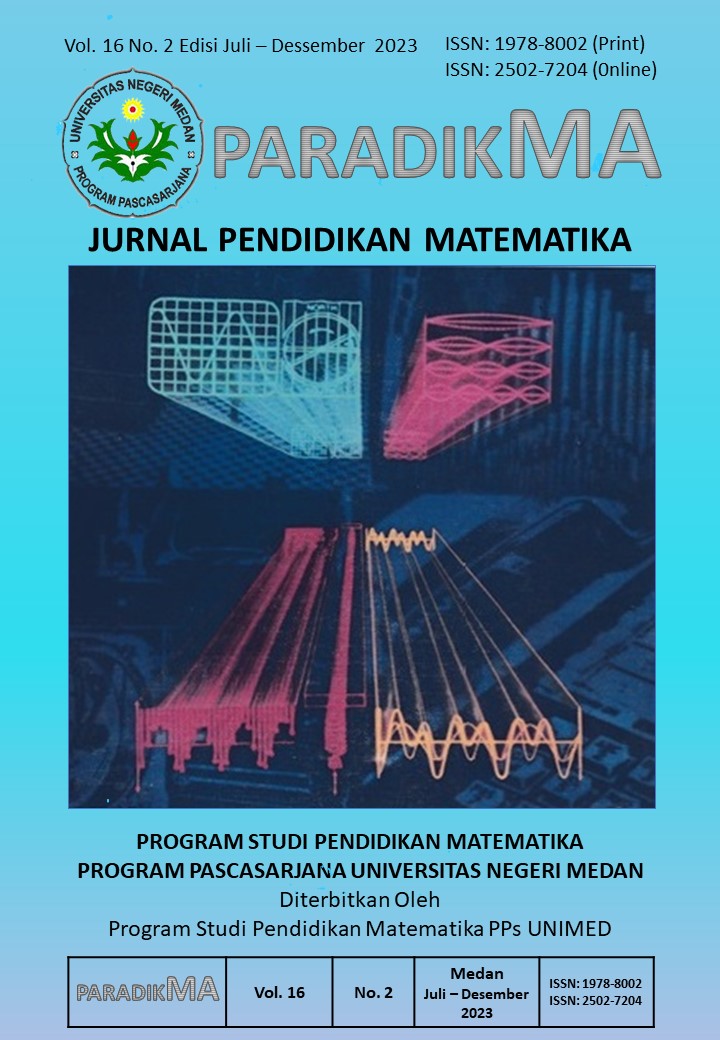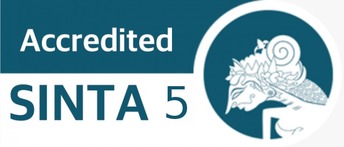The Effect of Deductive-Inductive Learning Approach on Creative Thinking Ability and Learning Motivation
DOI:
https://doi.org/10.24114/paradikma.v16i2.46952Abstract
Mathematics learning can have an impact on the development of one's mindset in the learning environment. This process is obtained through teacher innovation which provides learning with various methods and approaches that are in line with what will be taught. Inductive-deductive is an approach that can help students' creative thinking processes and increase learning motivation. For this reason, this study wanted to see how effective and influential this approach is on the ability to think creatively and motivation to learn. The method used is a significant test using one sample t-test and one paired sample t-test. The results obtained are t-count values of 2.09 and 10.66 for the inductive-deductive class and -0.848 and -0.94 for the conventional class where the t-table value is 1.684. Whereas to see the effect of the approach obtained values of 6.149 and 6.344 with a t-table of 1.960. The value that is greater than the t-table states that the class is effective and has influence, so it can be concluded that the inductive-deductive approach is effective for critical thinking skills and learning motivation, while conventional classes are not used effectively. The inductive-deductive approach also influences students' creative thinking abilities and learning motivation.References
Abramovich, S. et al. (2019). Teaching Mathematics Through Concept Motivation and Action Learning. Journal of Education Research International. 2019(1), 1-14
Alpian, Y. dkk (2019). Pentingnya Pendidikan Bagi Manusia. Jurnal Buana Pengabdian, 1(1), 66-72
Faturohman, I & Afriansyah, A. (2020). Peningkatan Kemampuan Berpikir Kreatif Matematis Siswa Melalui Creative Problem Solving. Jurnal Pendidikan Matematika Mosharafa. 9(1), 107-118
Hadi, F.R. (2021). Studi Literatur: Sumber dan Media Belajar. Seminar Nasional Bahasa, Sastra, Seni dan Pendidikan Dasar (SENSASEDA). Hal: 65-70. Banjarmasin: STKIP PGRI.
Harisudin, M. (2019). Secuil Esensi Berpikir Kreative dan Motivasi Belajar. Bandung: PT. Panca Terra Firma
Jawad, L & Majeed, B. (2019). The Impact of Teaching by Using STEM Approach in The Development of Creative Thinkinga and Mathematical Achievement Among the Students of The Fourth. Internationa Journal of Interactive Mobile Technologies. 15(13), 172-188
Lestari, K. (2015). Analisis Kemampuan Pembuktian Matematis Mahasiswa Menggunakan Pendekatan Induktif-Deduktif pada Mata Kuliah Analisis Real. Jurnal Kajian Pendidikan dan Pengajaran. 1(2), 128-135.
Ningsih, S. (2014). Realistic Mtahematic Education: Model Alternatif Pembelajaran di Sekolah. JurnalPendidikan Matematika UIN Antasari. 1(2), 73-94
Nurmuiza, I. Dkk. (2015). The Effect of Motivation on Mathematics Learning Outcomes High School Student. Jurnal Pendidikan Matematika. 6(2), 113-122
Suherman & Vidakovich, T (2022). Assesment of Mathematical Creative Thinking: A Systematic Review . Journal of Thinking Skills and Creativity, 44(2), 1-15
Thanheiser, E. (2023). What is the Mathematics in Mathematics Education . Journal of Mathematical of Behavior, 70(1), 1-13
Winarso, W. (2014). Membangun Kemampuan Bepikir Matematika Tingkat Tinggi Melalui Pendekatan Induktif, Deduktif dan Induktif-Deduktif dalam Pembelajaran Matematika. Journal of Mathematic Education Learning and Teaching (EDUMA). 3(2), 95-118
Wardani, S & Kusuma, I.W (2020). Comparison of Learning in Inductive and Deductive Approach to Increase Student™s Conceptual Understanding based on International Standard Curiculum. Jurnal Pendidikan IPA Indonesia. 9(1), 70-78
Wijayanti, N & Widodo, S. (2021). Studi Korelasi Motivasi Belajar Terhadap Hasil Belajar Matematika Selama Daring. Journal of Instructional Mathematics. 2(1), 1-9
Yudha, A. dkk (2022). Pengaruh Model Blended Learning dan Motivasi Belajar Terhadap Kemampuan Berpikir Kreative Siswa SMK. Jurnal Ilmiah Penelitian dan Pembelajaran Informatika. 7(2), 147-154







